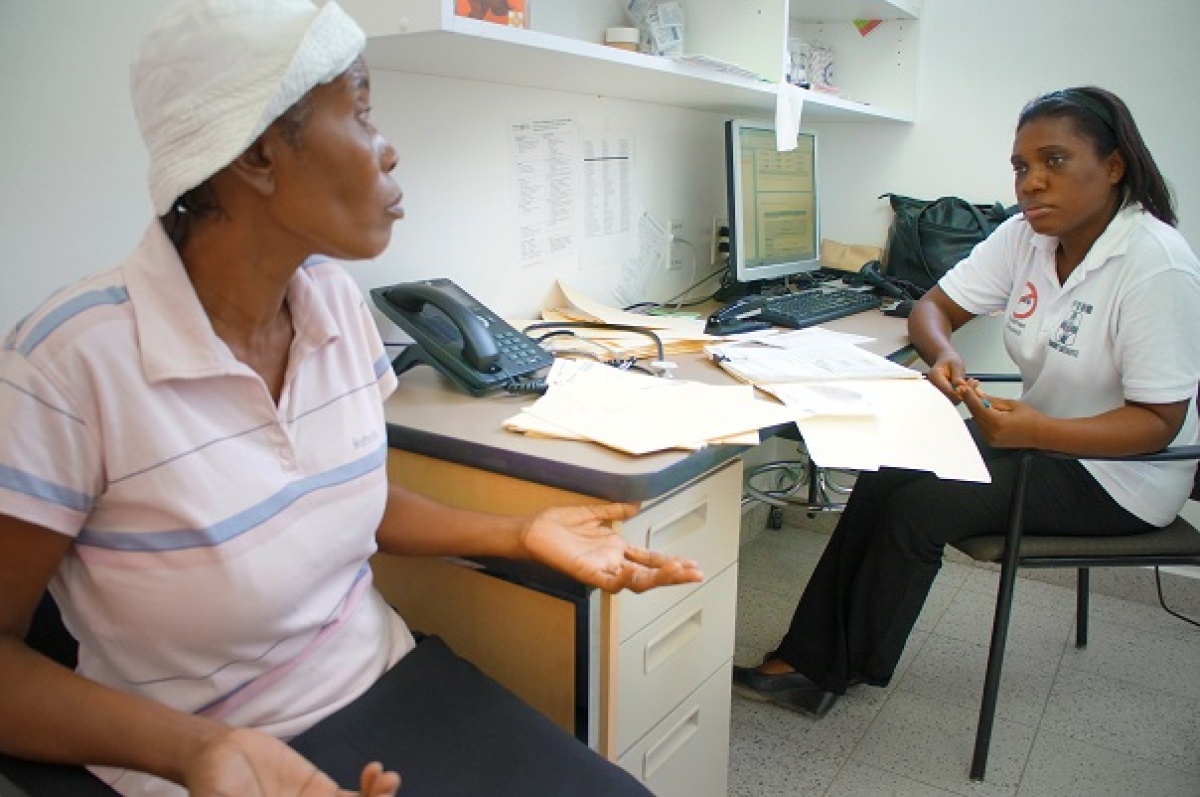Cancer Care Expands at University Hospital
Posted on Dec 20, 2013

Isemélie Bazard was the first patient at Haiti’s University Hospital to undergo surgery—a mastectomy to treat her breast cancer—and now her chemotherapy is almost complete.
Before her surgery in May, Bazard was worried for her life. With the surgery, chemotherapy, and counseling, she and her family have hope that she can recover. Bazard has just one more infusion. “I am looking forward to finishing chemotherapy so I can start working again to help my daughter pay for university,” Bazard said.
This summer, PIH and our Haitian sister organization, Zanmi Lasante (ZL), transitioned oncology services from a crowded, inadequate space in Cange to University Hospital in Mirebalais, where more patients can receive cancer prevention, treatment, and education efforts that are integrated with other services at the hospital.
Between July and November, the cancer care team provided services to about 700 patients, illustrating a huge demand for cancer care in Haiti.
Despite the perception that cancer only affects people in wealthy countries, cancer actually causes more deaths in low- and middle-income countries. And while about 80 percent of the global burden of cancer is born by people in the developing world, just 5 percent of the world’s expenditures on cancer care happen there.
Partners In Health has been working to save lives and demonstrate that the disease is treatable in poor, rural areas.
This year, PIH and our partners marked the one-year anniversary of the Butaro Cancer Center of Excellence in northern Rwanda, the first-ever comprehensive cancer center in rural East Africa. And in August, we celebrated the expansion of this facility by inaugurating the Butaro Ambulatory Cancer Center, which will provide chemotherapy to patients who don’t require hospitalization.
PIH/ZL is the only provider of free oncology services in Haiti. While PIH/ZL has always cared for cancer patients, even with limited capacity for treatment, an interdisciplinary team has worked over the last three years to formalize and integrate services for patients with cancer while building their skills through training.
The move to University Hospital has allowed the cancer care team to treat more patients; the demand has shown the need for more cancer care across Haiti. Between July and September, most patients—64 percent—came from the Port-au-Prince area, and only 22 percent from central Haiti, many referred by PIH/ZL clinics or other providers.
In the same period, breast cancer was the most common diagnosis for oncology patients, at 40 percent, followed by cervical cancer, at 12 percent, according to data from University Hospital’s electronic medical record system.
The cancer care team, headed by Haitian oncology director Dr. Ruth Damuse, has worked hard to provide comprehensive care for cancer patients. Their work has been supported by partners including the Avon Foundation, the LIVESTRONG Foundation, and the Dana-Farber Cancer Institute, which helps develop treatment plans for PIH/ZL patients. The DFCI has also created a special fellowship enabling expert oncology nurses from Boston to work at the hospital in three-month rotations and train staff on administration of chemotherapy and wound care.
Cancer care at University Hospital addresses the many needs of patients, including:
- Cancer screening, including biopsies and pathological testing
- Surgery and post-surgical wound care
- Intravenous chemotherapy in designated beds and chairs for infusion
- Oral chemotherapy
- One-on-one counseling and support groups to help patients cope with their cancer diagnoses and treatment side effects
- Referrals to a partner hospital in the Dominican Republic for radiation therapy
- Education on cancer, including breast self-exams and community awareness events to encourage people to seek care early
- Palliative care
Oncology social worker Oldine Deshommes described one patient’s experience with breast cancer:
“The first time I saw Mrs. A, she was crying. She felt humiliated because of her cancer. Her wound was infected and had a bad smell. She said even though she was not yet dead, she was ashamed to sit near others.
We talked about how she should not feel excluded from others, showing her that she is not responsible for her illness. We also talked about what she can do to get healthy; reminding her that she is not alone, that we are with her in this fight.
In our group sessions she talked about how she felt before coming to the support group. She actively participates in the groups, and it helps her see that she is not alone in experiencing changes to her life from cancer. She said she no longer feels lonely and she has made friends from the support group who encourage her.”
With support from Deshommes, Bazard was able to delay her last round of chemo a couple of weeks, until January. She wanted to feel well for her daughter’s wedding.

